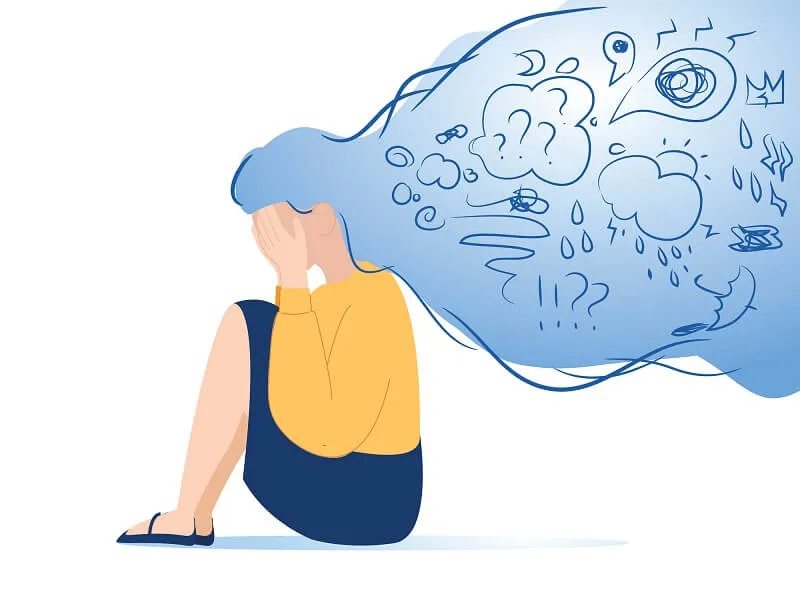The human mind loves to be negative, it is the way we have to stay alert to danger. Sometimes we get carried away by unrealistic thoughts without realizing it. We distort reality and this has negative consequences that can lead to depression, anxiety, low self-esteem, conflict in relationships or drug use.
Aaron T. Beck, was the psychiatrist who identified these unrealistic negative messages that he baptized as cognitive distortions. What he discovered is that what we say to ourselves affects our mood and behavior, and that we can learn to identify these distortions to overcome them.
A wide variety of distortions have been identified, but these are the most common:
- All or nothing thinking: It is about seeing the black-or-white world without contemplating middle terms. If something is not perfect, we see it all as a complete failure.
- Overgeneralization: We draw a negative conclusion from an isolated event and anticipate the same outcome under similar circumstances. For example, when a couple breaks up, tell us that we will never be with anyone.
- Filtering: We focus on the negative, thus contaminating the positive. If we get a promotion at work, we quickly and exclusively focus on increasing the workload.
- Disqualification of the positive: We transform the positive things that surround us into neutral or negative. By giving ourselves a praise, we quickly find out why we don't deserve it.
- Hasty conclusions: Within this trend of thought we find two variants:
Mind Reading: We believe that we know what others think of us and why they behave the way they do. When a friend does not reply to a message, instead of assuming that he has not had time, we ask ourselves directly what we have done to offend him.
Fortune Teller's Error: You look to the future with pessimism. We know that the presentation is going to go wrong or that no one will ever like it.
- Magnification and minimization: In magnification we exaggerate the importance of things to the point of catastrophe. For example, thinking that our cough must mean cancer. In minimization, we downplay the positives including qualities and achievements.
- Emotional reasoning: We believe that the negative emotions we feel reflect reality. "I feel useless, therefore I am useless."
- “Should” statements: We apply rigid rules about our obligations or those of others. "I should get married before 30." "Others should act in such a way" If these rigid beliefs are not fulfilled we feel guilty and if others do not measure up we feel frustrated.
- Labeling: We see others or ourselves with general criteria ignoring other important aspects of the way of being. We label ourselves failures instead of telling ourselves we've just made a mistake.
- Personalization: We take responsibility for the actions of others or we attribute phenomena to ourselves without a basis for such a connection "My son has failed because of me ..." "Surely that comment says it for me ..."
Being able to identify the forms of thought that depress us has allowed us to develop a therapy for modifying negative thoughts that to date has proven to be effective and which we call cognitive restructuring.
Article Referenced:
- https://www.psychological-consulting.com
- Boss, J. (2015, Mar.). How to overcome the ‘analysis paralysis’ of decision-making. Forbes. Retrieved July 16, 2020 from https://www.forbes.com/sites/jeffboss/2015/03/20/how-to-overcome-the-analysis-paralysis-of-decision-making/#cea3e9f1be5a.
- Canner, N. & Bernstein, B. (2016, Nov.). Why is micromanagement so infectious? Harvard Business Review. Retrieved July 16, 2020 from https://hbr.org/2016/08/why-is-micromanagement-so-infectious.
- Hewitt, P. L. (2020). Perfecting, belonging, and repairing: A dynamic-relational approach to perfectionism. Canadian Psychology/Psychologie Canadienne, 61(2), 101–110. https://doi.org/10.1037/cap0000209.
- Musch, S. (n.d.). Overcoming self-criticism. University of Oregon. Retrieved July 16, 2020 from https://counseling.uoregon.edu/overcoming-self-criticism.
- National Institute of Mental Health (2018, Jul.). Anxiety disorders. Retrieved July 16, 2020 from https://www.nimh.nih.gov/health/topics/anxiety-disorders/index.shtml.
- Zakrzewsi, V. (2013, Dec.). How to Help Kids Overcome Fear of Failure. Retrieved July 16, 2020 from https://greatergood.berkeley.edu/article/item/how_to_help_kids_overcome_fear_of_failure.
